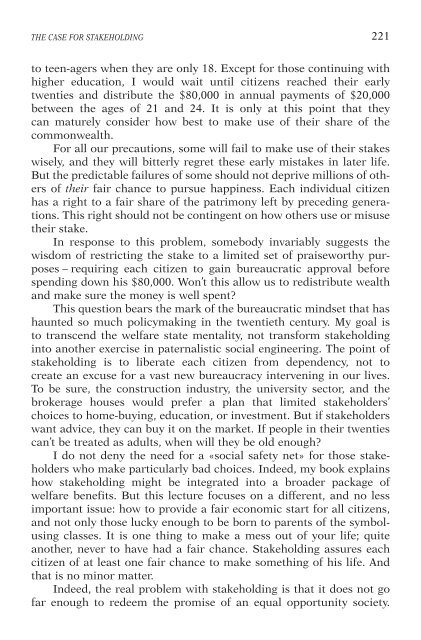Revista (PDF) - Universidade do Minho
Revista (PDF) - Universidade do Minho
Revista (PDF) - Universidade do Minho
Create successful ePaper yourself
Turn your PDF publications into a flip-book with our unique Google optimized e-Paper software.
THE CASE FOR STAKEHOLDING 221<br />
to teen-agers when they are only 18. Except for those continuing with<br />
higher education, I would wait until citizens reached their early<br />
twenties and distribute the $80,000 in annual payments of $20,000<br />
between the ages of 21 and 24. It is only at this point that they<br />
can maturely consider how best to make use of their share of the<br />
commonwealth.<br />
For all our precautions, some will fail to make use of their stakes<br />
wisely, and they will bitterly regret these early mistakes in later life.<br />
But the predictable failures of some should not deprive millions of others<br />
of their fair chance to pursue happiness. Each individual citizen<br />
has a right to a fair share of the patrimony left by preceding generations.<br />
This right should not be contingent on how others use or misuse<br />
their stake.<br />
In response to this problem, somebody invariably suggests the<br />
wis<strong>do</strong>m of restricting the stake to a limited set of praiseworthy purposes<br />
– requiring each citizen to gain bureaucratic approval before<br />
spending <strong>do</strong>wn his $80,000. Won’t this allow us to redistribute wealth<br />
and make sure the money is well spent?<br />
This question bears the mark of the bureaucratic mindset that has<br />
haunted so much policymaking in the twentieth century. My goal is<br />
to transcend the welfare state mentality, not transform stakeholding<br />
into another exercise in paternalistic social engineering. The point of<br />
stakeholding is to liberate each citizen from dependency, not to<br />
create an excuse for a vast new bureaucracy intervening in our lives.<br />
To be sure, the construction industry, the university sector, and the<br />
brokerage houses would prefer a plan that limited stakeholders’<br />
choices to home-buying, education, or investment. But if stakeholders<br />
want advice, they can buy it on the market. If people in their twenties<br />
can’t be treated as adults, when will they be old enough?<br />
I <strong>do</strong> not deny the need for a «social safety net» for those stakeholders<br />
who make particularly bad choices. Indeed, my book explains<br />
how stakeholding might be integrated into a broader package of<br />
welfare benefits. But this lecture focuses on a different, and no less<br />
important issue: how to provide a fair economic start for all citizens,<br />
and not only those lucky enough to be born to parents of the symbolusing<br />
classes. It is one thing to make a mess out of your life; quite<br />
another, never to have had a fair chance. Stakeholding assures each<br />
citizen of at least one fair chance to make something of his life. And<br />
that is no minor matter.<br />
Indeed, the real problem with stakeholding is that it <strong>do</strong>es not go<br />
far enough to redeem the promise of an equal opportunity society.











![Programa [pdf] - cehum - Universidade do Minho](https://img.yumpu.com/17305425/1/190x135/programa-pdf-cehum-universidade-do-minho.jpg?quality=85)




